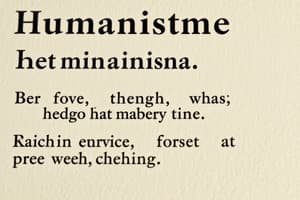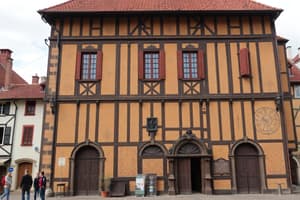Podcast
Questions and Answers
What does 'Renaissance' refer to?
What does 'Renaissance' refer to?
- A specific religious group
- Rebirth of art and learning (correct)
- A movement for religious reform
- A worldly perspective
What is Humanism?
What is Humanism?
An intellectual movement focused on human potential and achievements
Secular refers to spiritual matters.
Secular refers to spiritual matters.
False (B)
What is a Patron in the context of the Renaissance?
What is a Patron in the context of the Renaissance?
What does Perspective show in art?
What does Perspective show in art?
What does 'Vernacular' mean?
What does 'Vernacular' mean?
What is Utopia?
What is Utopia?
Who is William Shakespeare?
Who is William Shakespeare?
Who developed a printing press that incorporated various technologies?
Who developed a printing press that incorporated various technologies?
What is an Indulgence?
What is an Indulgence?
What does Reformation mean?
What does Reformation mean?
Who were the Lutherans?
Who were the Lutherans?
What does Protestant refer to?
What does Protestant refer to?
What was the Peace of Augsburg?
What was the Peace of Augsburg?
What does Annul mean?
What does Annul mean?
What is Anglican?
What is Anglican?
What is Excommunication?
What is Excommunication?
What is a Heretic?
What is a Heretic?
What does Predestination mean?
What does Predestination mean?
What is Calvinism?
What is Calvinism?
What is a Theocracy?
What is a Theocracy?
Who are the Presbyterians?
Who are the Presbyterians?
What does Anabaptist mean?
What does Anabaptist mean?
What was the Catholic Reformation?
What was the Catholic Reformation?
Who are the Jesuits?
Who are the Jesuits?
What was the Council of Trent?
What was the Council of Trent?
Flashcards are hidden until you start studying
Study Notes
Key Concepts of the Renaissance and Reformation
- Renaissance signifies a cultural rebirth emphasizing art and learning.
- Humanism revolves around the potential and accomplishments of humans, shifting focus from divine to earthly matters.
- Secularism prioritizes worldly aspects over spiritual concerns, reflecting changing attitudes during the Renaissance.
- Patrons, particularly church leaders, financially supported artists, enhancing the beauty of cities like Rome.
- Perspective technique allows the illusion of three dimensions in art, revolutionizing visual representation.
- Vernacular refers to the native language of regions, impacting literature and communication.
- Utopia describes an imagined perfect society, originating from Thomas More's work.
- William Shakespeare is celebrated as the most prominent writer of the Elizabethan Age, known for his profound impact on drama and literature.
- Johann Gutenberg invented a transformative printing press, merging various technologies, crucial for spreading ideas.
- Indulgences were pardons for sins, a controversial practice leading to calls for reform.
The Reformation Movement
- Reformation denotes a significant movement aimed at religious change within Christianity.
- Lutherans stem from Martin Luther and his followers, marking the emergence of a distinct religious group.
- Protestantism encompasses Christians outside the Catholic Church, signifying the fragmentation of Western Christianity.
- Peace of Augsburg (1555) allows each German state's ruler to determine its religion, reflecting rising religious pluralism.
- Annul refers to the act of declaring something void, particularly in the context of marriage and legitimacy.
- Anglicanism aligns with the Church of England, establishing a national Church separate from Catholic influence.
- Excommunication represents the formal expulsion from the Church, affecting one's religious community status.
- Heretics are individuals whose beliefs deviate from established Church doctrine, often facing persecution.
Key Theological Principles
- Predestination is the belief that God has preordained who will receive salvation, a core tenet in certain reformed traditions.
- Calvinism represents John Calvin's religious principles, highlighting predestination and a disciplined Christian lifestyle.
- Theocracy indicates governance led by religious authorities, intertwining politics and theology.
- Presbyterians are followers of John Knox, reflecting Calvinist teachings in church governance.
- Anabaptists advocate for adult baptism, emphasizing personal belief and commitment over infant baptism.
- Catholic Reformation refers to the Church's internal initiative to reform practices and retain loyalty among believers.
- Jesuits are key figures in the Catholic Reformation, focusing on education and missionary work to counter Protestant movements.
- The Council of Trent convened to address doctrinal issues and reaffirm Catholic teachings in response to the Reformation.
Studying That Suits You
Use AI to generate personalized quizzes and flashcards to suit your learning preferences.




